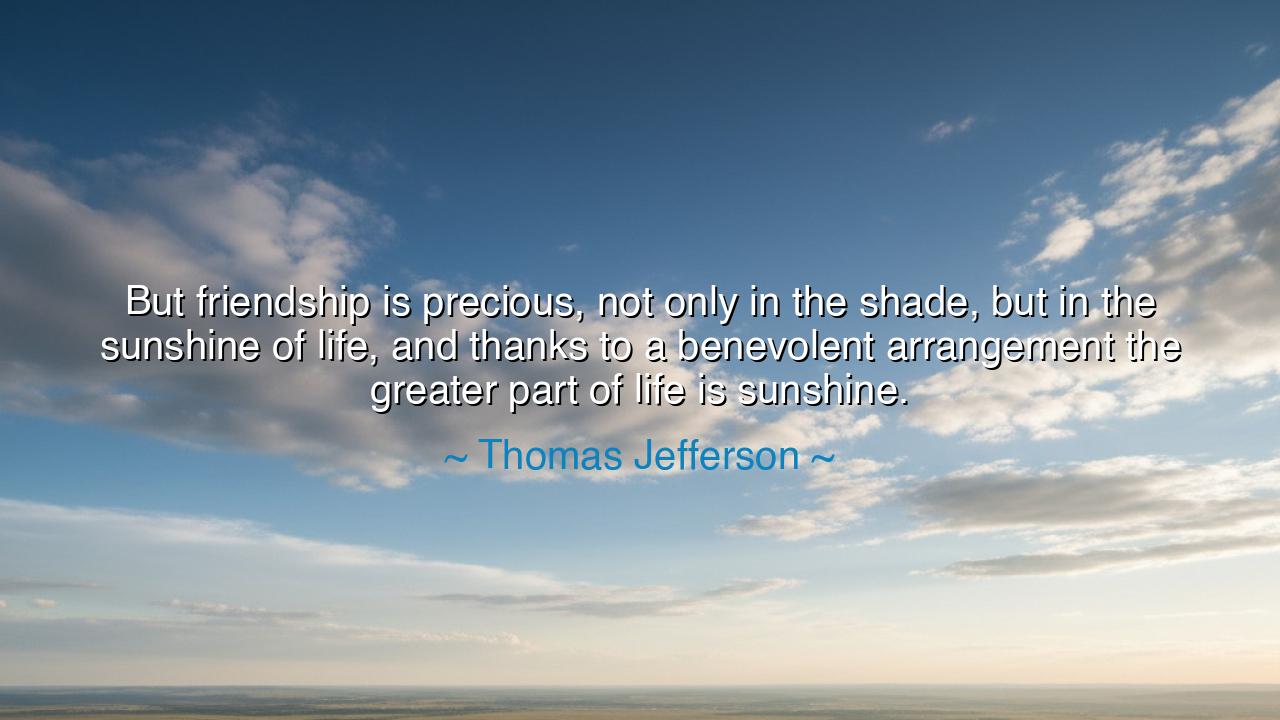
But friendship is precious, not only in the shade, but in the
But friendship is precious, not only in the shade, but in the sunshine of life, and thanks to a benevolent arrangement the greater part of life is sunshine.






“But friendship is precious, not only in the shade, but in the sunshine of life, and thanks to a benevolent arrangement the greater part of life is sunshine.”
So wrote Thomas Jefferson, a man of both reason and feeling, a statesman whose heart, though weighed with duty, still cherished the quiet grace of friendship. In this tender reflection, Jefferson reminds us that friendship is not merely a refuge for sorrow or adversity, but a joy in itself, to be celebrated in the bright hours as much as in the dark. Many think of friends as those who come to comfort us in grief, yet Jefferson saw beyond that: he believed friendship to be a gift that adorns the sunshine of life—the happy, ordinary days that make up most of our existence.
The origin of these words lies in a letter Jefferson wrote to Maria Cosway, a friend with whom he shared both affection and philosophical correspondence. It was during one of his reflective moods that he penned this truth. Having endured loss, exile, and the burdens of political strife, Jefferson had learned that sorrow is not the only soil where friendship grows. Indeed, the benevolent arrangement of life—its balance between light and shadow—allows us to appreciate companionship most deeply in times of joy. He recognized that while friendship steadies us in pain, it also amplifies delight, transforming simple pleasures into sacred experiences.
To say that friendship is precious in the sunshine is to honor it as a bond that does not depend on suffering. It is the friend who laughs with us—not only the one who weeps with us—who teaches us the full measure of love. For when the heart is untroubled, and life runs smooth as a river beneath blue skies, it is easy to forget gratitude; yet it is precisely then that friendship reveals its quiet beauty. It is in shared laughter, in unspoken understanding, in the peaceful companionship of ordinary days that friendship ripens into its truest form.
Consider the example of Thomas Jefferson and John Adams, two men bound first by common cause, later divided by politics, and finally reconciled by affection. They stood together through the Revolution’s shade, when the future of a nation trembled, and they rejoiced together in the sunshine of independence. Though their paths diverged and years of silence fell between them, they rediscovered the sweetness of friendship in their old age. Through letters that crossed the ocean of time, they found again that same benevolent truth Jefferson had written of: that life’s greater part is light, and that friendship, whether tested by conflict or distance, shines brightest when it rejoices in peace.
Jefferson’s philosophy of friendship carries the calm wisdom of one who has seen both joy and grief and found meaning in both. To call life “a benevolent arrangement” is not to deny sorrow, but to affirm that love, companionship, and gratitude outweigh it. Life’s storms come, but they pass; the sunshine remains. And friendship—when true—belongs to both realms: it gives shade when we are weary, and warmth when we are strong. It is not a medicine only for pain, but a feast for the soul in times of plenty.
In this, Jefferson echoes the wisdom of the ancients. Aristotle once wrote that friendship is the most necessary of all virtues for life, for without friends, no one would choose to live, even with all other blessings. Yet Jefferson adds a gentler note: that it is not need alone, but appreciation that sustains friendship. We must not remember our friends only when we are in need, but honor them when our hearts are light, when the day is bright, when we have something to share. For in joy, the soul’s gratitude grows, and friendship deepens without demand.
Let this be the lesson, O seeker of wisdom: cherish your friends not only when the world turns cold, but also when it is radiant with peace. Do not wait for grief to remind you of their worth. Walk with them in the gardens of laughter as you would in the valleys of sorrow. Speak your gratitude often; break bread together; write to them while your hearts are full, not only when they are heavy. For friendship, like sunlight, is a daily blessing—quiet, life-giving, and too easily taken for granted.
Thus, Jefferson’s words are not merely a reflection, but a call to joy. Friendship is precious, he says, because it transforms both the shade and the sunshine into moments of meaning. Life, by divine mercy, grants us far more light than darkness. And if we have friends to walk beside us in that light—to share our laughter, to witness our growth, to remind us of goodness—then we live not only wisely, but richly. For in the end, friendship is not the shadow cast by the setting sun; it is the sunlight itself, lingering gently upon the soul.






AAdministratorAdministrator
Welcome, honored guests. Please leave a comment, we will respond soon